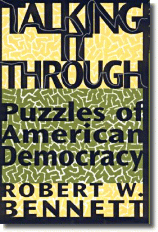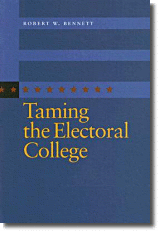It's anachronistic, it's anti-democratic, and it's resulted in three men who lost the popular vote becoming president. So why don't we just get rid of it?Yoffe rounded up the quick answers to her question.
Now law professor Robert W. Bennett has given the issue a more considered treatment in his 2006 book, Taming the Electoral College.
Robert W. Bennett is the Nathaniel L. Nathanson Professor of Law and former Dean of the School of Law at Northwestern University. I asked him to apply the "page 69 test" to his book; here is his reply:
Page 69 of Taming the Electoral College comes near the discussion in chapter four of major alternatives to the electoral college advanced over the years, and concentrating on a nationwide popular vote. A nationwide vote poses the question of whether a runoff would be held if no candidate achieved a majority, or even a "sufficient" plurality, and page 69 discusses the possibly confounding effect in a runoff regime of what political scientists refer to as "strategic voting." I do not think that chapter four is particularly "representative" of the book as a whole, in the sense that it and the two preceding historical chapters set the stage for the meat of the book which is found in chapters five through nine. Those chapters confront hidden perils in the electoral college process, due largely to the fact that it was designed with a selection mechanism in mind that is worlds apart from what we have come to expect today. The two major perils are that the outcome of a presidential election would be changed by "faithless electors," and that the selection process might be thrown into the House of Representatives, where each state would get one vote. In any given election neither of these is likely, but the 2000 election suggests that those possibilities should not be dismissed as remote. Proceeding on the assumption that constitutional amendment of the electoral college process is essentially unattainable, I advance non-constitutional ways to deal with the two major perils, and a host of minor ones. Chapter ten then returns to the nationwide vote possibility, advancing a non-constitutional route to that as well, which has actually made some headway in a number of states in recent months.Many thanks to Robert for the input.
Click here to read the Preface and here to read the Introduction to Taming the Electoral College.
Among the praise for the book:
“The electoral college is a disaster waiting to happen. But the brief interest kindled by the 2000 election, in which the electors chose a president who lost in the popular vote, dissipated in the face of 9/11 and other matters of more immediate concern. Without downplaying the importance of wholesale reform, Robert Bennett, a distinguished constitutional scholar, argues lucidly and persuasively that incremental changes could avert major crises, such as subversion of the democratic process by ‘faithless electors’ who do not adhere to their mandates.”—Paul Brest, Dean Emeritus, Stanford Law School; President, William and Flora Hewlett FoundationTo whet your appetite for Bennett's argument and ideas, see this essay at the Northwestern University Law Review.

Bennett's 2002 book is Talking It Through: Puzzles of American Democracy:
He focuses on four puzzles of American democracy that can be “solved” through his approach. These are: lack of concern about the apportionment of the United States Senate; inattention to the anomalous political treatment of children; the perceived “counter-majoritarianism” of judicial review in enforcement of the U.S. Constitution; and the much-discussed paradox of voting: why do so many citizens vote when their individual ballots have almost no chance of changing election outcomes?Previous "page 69 tests":
Nicholas Stern et al, Stern Review Report
Kerry Emanuel, Divine Wind
Adam Langer, The Washington Story
Michael Scott Moore, Too Much of Nothing
Frank Schaeffer, Baby Jack
Wyn Cooper, Postcards from the Interior
Ivan Goncharov, Oblomov
Maureen Ogle, Ambitious Brew
Cass Sunstein, Infotopia
Paul W. Kahn, Out of Eden
Paul Lewis, Cracking Up
Pagan Kennedy, Confessions of a Memory Eater
David Greenberg, Nixon's Shadow
Duane Swierczynski, The Wheelman
George Levine, Darwin Loves You
John Barlow, Intoxicated
Alicia Steimberg, The Rainforest
Alan Wolfe, Does American Democracy Still Work?
John Dickerson, On Her Trail
Marcus Sakey, The Blade Itself
Randy Boyagoda, Governor of the Northern Province
John Gittings, The Changing Face of China
Rachel Kadish, Tolstoy Lied
Eric Rauchway, Blessed Among Nations
Tim Brookes, Guitar and other books
Ruth Padel, Tigers in Red Weather
William Haywood Henderson, Augusta Locke
Jed Horne, Breach of Faith
Robert Greer, The Fourth Perspective
David Plotz, The Genius Factory
Michael Allen Dymmoch, White Tiger
Patrick Thaddeus Jackson, Civilizing the Enemy
Tom Lutz, Doing Nothing
Libby Fischer Hellmann, A Shot To Die For
Nelson Algren, The Man With the Golden Arm
Bob Harris, Prisoner of Trebekistan
Elaine Flinn, Deadly Collection
Louise Welsh, The Bullet Trick
Gregg Hurwitz, Last Shot
Martha Powers, Death Angel
N.M. Kelby, Whale Season
Mario Acevedo, The Nymphos of Rocky Flats
Dominic Smith, The Mercury Visions of Louis Daguerre
Simon Blackburn, Lust
Linda L. Richards, Calculated Loss
Kevin Guilfoile, Cast of Shadows
Ronlyn Domingue, The Mercy of Thin Air
Shari Caudron, Who Are You People?
Marisha Pessl, Special Topics in Calamity Physics
John Sutherland, How to Read a Novel
Steven Miles, Oath Betrayed
Alan Brown, Audrey Hepburn's Neck
Richard Dawkins, The Ancestor's Tale
--Marshal Zeringue






